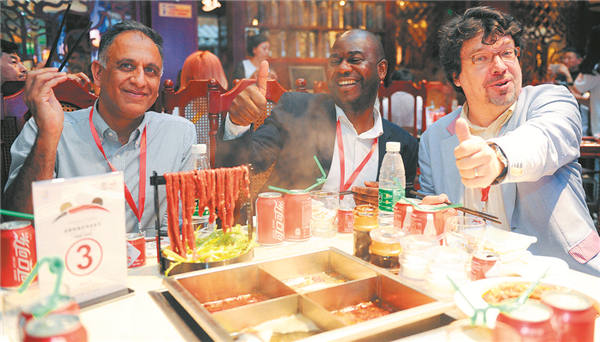The 31st Summer World University Games are not only a sports event, but a cultural exchange platform for athletes from all over the world. Chengdu, the Sichuan capital known as the “city with the highest sense of happiness” in China, will offer a glimpse into the country’s cultural charm and vitality.
Sichuan is well known for its economic strength, large population, competitive science and educational resources, and abundant natural resources, and has been reputed as the Land of Abundance since ancient times.
Boasting a long history, Sichuan is the cradle of ancient Shu civilization, and the place where Jiaozi — the earliest banknote in the world — was born. Sichuan Brocade and Sichuan Shadow Play have been included in UNESCO’s list of intangible cultural heritage. People of the ancient Ba and Shu states, created stunning civilizations represented by the Sanxingdui Ruins and the Jinsha Site, as well as rich cultures such as the Three Kingdoms (220-280) and the Tibetan, Qiang and Yi cultures.
The province is home to many natural wonders: “The King of Mountains in Sichuan” — Mount Gongga, the Jiuzhaigou Valley national park, the poetic and picturesque Ruoergai Prairie, and “the last Shangri-La” — Yading Nature Reserve. It is also a treasure house of biodiversity and home to the giant panda.
Chengdu, with a population of more than 21 million, is the only megacity in the world where both captive and wild giant pandas live. The Hollywood movie series Kung Fu Panda selected Chengdu as the backdrop to film distinct local elements.
The Chengdu Research Base of Giant Panda Breeding is one of the most famous artificial breeding bases for giant pandas in the world. Initiated in 1987 through the rescuing of six sick and hungry giant pandas from the wild, the base has been home to more than 200 giant pandas which is the largest population of domestically bred giant pandas in the world.
The prototype of Rongbao, the mascot of the 31st Summer World University Games, comes from a giant panda named Zhima that lives in the base.
According to the fourth national survey of giant pandas in 2015, there are 73 wild giant pandas in the Chengdu area of the Giant Panda National Park.
Giant pandas have become a cultural symbol of Sichuan and Chengdu, the image of which is integrated into the urban design, including sculptures, buses and toys.
Kevin Schooling from the United States has lived in many cities in China including Tianjin, Wuxi, Suzhou and most recently Chengdu. Schooling said that he came here not only for pandas, but also to experience the food and culture.
Chengdu is a city with a profound civilization of more than 4,500 years and an urban history of over 2,300 years.
It not only inherits the splendid Chinese civilization, but also nurtures the unique Tianfu culture.
There are world natural and cultural heritage sites such as the Qingcheng Mountain, Dujiangyan and habitats for giant pandas. There are also cultural sites such as the Jinsha Site, Wuhou Shrine Museum, and the Du Fu Thatched Cottage Museum, as well as intangible cultural heritage elements that have been passed down for thousands of years such as Sichuan Opera along with Shu brocade and embroidery.

A gold ornament featuring the sun and immortal birds discovered at the Jinsha Site was designated as a symbol of Chinese cultural heritage.
As one of the eight major Chinese cuisines, Sichuan cuisine is popular all over the world with its unique flavor. Recognized as a city of gastronomy by UNESCO, Chengdu is the birthplace of classic Sichuan dishes such as kung pao chicken and mapo tofu. It is also famous for spicy and delicious hot pot and a variety of snacks.
Li Bai and Du Fu, two great poets during the Tang Dynasty (618-907) in China, both stayed in Chengdu and wrote many poems. Schooling said he loves poetry. “I’ve tried to understand some of their poetry,” he said. “It’s exciting to read it and understand their journey across China.”
Koung Manivong, a Lao student at Chengdu University, came to the city because of her love for the Three Kingdoms culture. “I heard a lot of Chinese stories when I was a child, which made me particularly interested in Chinese culture,” she said. She likes the character of Zhuge Liang, a military strategist of the Shu Kingdom (221-263), in the Romance of the Three Kingdoms, and feels excited to study in the same place where he lived. Zhuge is a symbol of wisdom and loyalty in traditional Chinese culture.
For Three Kingdoms culture fans, Wuhou Shrine Museum is a must-see place in Chengdu. It was built in memory of the heroes who died during that period.
Jinli, an ancient street beside the museum, which also features the culture of Three Kingdoms, was named by CNN Travel as one of the world’s 21 most beautiful streets.
In recent years, with the continuous expansion of China’s opening-up to the outside world, Sichuan’s exchanges with the world have become increasingly frequent and Chengdu emerged as a leader among China’s “new first-tier cities”.
Chengdu is home to more than 20 consular institutions and more than 100 international sister cities and cities with friendly and cooperative relations. It has built trade relations with more than 200 countries and regions around the world.
Chengdu is the third city on the Chinese mainland to have dual international airports after Beijing and Shanghai, and has opened up more than 130 international routes.
Chengdu’s history and culture complement each other with modern fashion. The fast pace of the metropolis blends perfectly with the slow life of the city, giving birth to the unique aesthetics of life.
An open and inclusive cultural atmosphere and a uniquely attractive lifestyle have become important factors that attract people to stay in Chengdu.
“Chengdu is really a place to discover. Every corner has a surprise,” said Radek Cais, a Canadian who works in Chengdu’s hotel industry. Cais added that he chose the city because it is full of vigor and life. “Chengdu people’s attitude of living in the moment is also attractive to me.” Cais enjoys Chinese tea culture and appreciates the teahouses all over Chengdu.
Abolfazl Bayat, a British expert who works at the University of Electronic Science and Technology of China, has lived in Chengdu for five years. “Chengdu offers a very nice balance of work and life in China. If you want to come to China, this is the best place,” he said.
Source : China Daily
















Add Comment